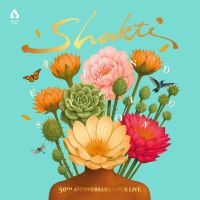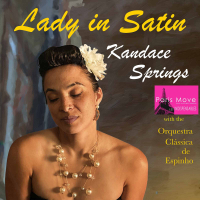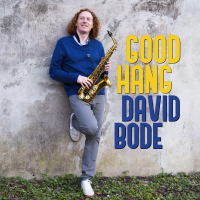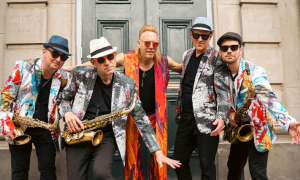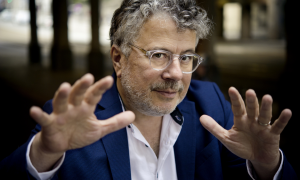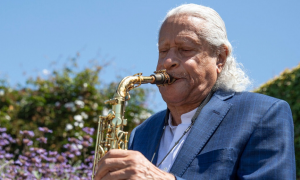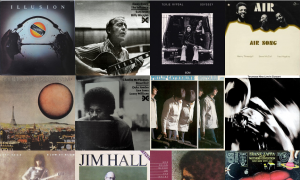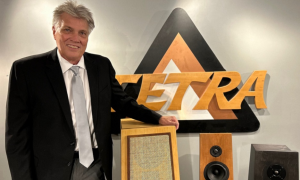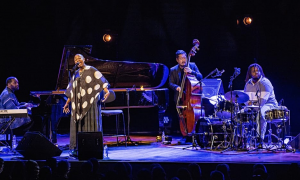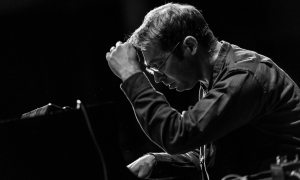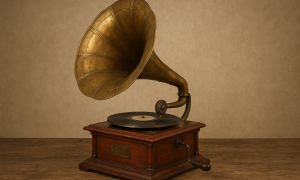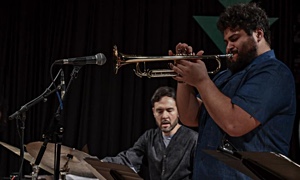Home » Jazz Articles » Interview » Christian McBride: Getting the Inside Straight
Christian McBride: Getting the Inside Straight
CMB: The jazz museum is going really, really, really, really well. We have a new building that we're going to be moving to probably in 2012. We have been designated for a new spot directly across the street from the Apollo Theater. And we also are going to be sharing that space with the New York City Department of Tourism, so there's going to be some heavy traffic on that building, and we're really, really excited about it.
AAJ: I know I actually found out about the Jazz Museum of Harlem because of you.
CMB: Well, the story goes like this... Leonard Garment is a former White House lawyer under the Nixon administration. He is a huge jazz fan, grew up in New York, played saxophone when he was a teenager, and he is retired now, and wanted to start a museum. He's been a lifelong New Yorker, and realized that there is a museum in New York for almost everything in the arts, except jazz. There are museums that have jazz in it, but there is no place that is an exclusive jazz home, so he got some of his lawyer friends in Washington, D.C., with deep pockets, and they started a board to do a jazz museum.
Of course, at some point you just need to call some musicians to come and help you, you just can't have a bunch of rich guys who mean well, but you know, you kinda need somebody in the business who knows about it to help you put it together. So, I believe it was in 1999 or 2000, Leonard knew Loren Schoenberg, who is a very well-respected jazz historian, writer, saxophonist, educator, here in New York, and then Loren and I, we worked together at Jazz Aspen every summer as well, so after being involved with the museum for about two years, Loren said, "well, it really, really would help the face of the museum a lot if you came on board with me as my co-director."
And I thought, man I'd be honored because I always loved Harlem, it reminds me of Philly, it reminds me of where I grew up.
And Harlem, like many places in this country, particularly where a lot of black people live, they need that culture in their neighborhood, because at one time that culture was available in the neighborhood, and then moved out of there, and it started going downtown. It was good in terms of musicians maybe made more money, the accommodations were better for musicians but it took the culture out of the neighborhood. So I'm glad that there can be a home for jazz in Harlem.
And I've been working with them for about six years now, I believe it is; and we've had some amazing moments up there, we have a lot of great programs, like "Jazz for Curious Readers," which we invite a writer to come and basically give a dissertation on whatever books they are writing. Then Jazz for Curious Listeners, where we feature the music of a certain artist, and we just play records for our listeners, and they are free, so we always have really big turnouts. And Harlem Speaks was basically the program that really got the museum running. So there's a lot of good things going on up there, so check out the Web site, it's www.jazzmuseumofharlem.org. And you can see all the different things going on.
AAJ: Don't you feel sometimes that jazz should be broadcast more than it is?
With McCoy Tyner and Jeff "Tain" Watts
CMB: Oh, of course! I mean, unfortunately, as I said earlier, when we were talking about the whole Michael Jackson frenzy, welcome to America, where people love, they absolutely have a fascination for BS. They know it is, and they still like it. [laughs]. So, I say that to say that, yes, jazz should be heard more but I think that would confuse people because it would be like eating healthy food every day. Why would we want to do something as awful as that, eat healthy food every day? Why would we want to work out every day, even though we know it's good for us, and we know we need to do that? But yeah, I am not excluding myself either, I am an American citizen myself, too, but I try to train myself not to watch the news too much. I don't watch American Idol, I don't watch Cougar Town, and I never watched Sex in the City. It's just escapism, and it's fine, every now and then you need it, but I found that so many people make a meal out of that, like eating fast food every day. So jazz is really good, strong, serious, important, cultural music, and you will not hear it on mainstream radio, you will not see it on mainstream television because it's too serious.
Even guys who make it fun, like Roy Hargrove and Chick Corea, guys who make it entertaining, for even the non-jazz listener. So it's hard to get their voices heard by the mainstream, because that is just how it is. But I also think that the music will outlast everything that is weak. Everything that is serious, everything that is done with a high level of artistry is always going to be timeless. Unfortunately, the masses may not catch up with it until much, much later, but the music will always survive. That is why people always predicted the death of jazz, and they've been saying that for half a century now, and if it is not dead by now, I am sure it's not going anywhere now.
AAJ: I have also heard for years that some people have accused jazz of being too intellectual. And I think there is a difference in people as well; I don't feel jazz the same way my father did.
CMB: That's the flip side of the coin because sometimes it seems, particularly inside the jazz world, the more intellectual it can be, the more cerebral; the more esoteric it can be, the more heralded it can be, as being highly artistic, and really creative music. As if playing the blues was old, or somehow keeping the music from progressing. I disagree with that whole-heartedly, because if you listen to for example the Count Basie band, or the Duke Ellington band, are you going to tell me that that is old? Anybody who wants to perform the music like that is preventing the music from progressing? I think not.
I think that's an awful way to tell people that intellectual jazz is the music that people really need to be appreciating. So yeah, that is why people think jazz is too intellectual, that is why people don't want to hear it, because people inside the jazz world are subconsciously making people think that. "Oh well, in order to be really serious, in order to really make a statement, as a true creative artist, you can't just swing, you can't make people feel good, that's been done already, you got to make something different with the music." You don't need time, you don't need changes, you don't need a melody, you need to be weird. [Laughs]
So, yeah, there is a small contention of musicians I think who can, sometimes, only sometimes, over intellectualized the music, and I think they have pulled a certain group of people away from the music. But I think there is a strong contingent of musicians who don't do that, they like to have fun when they play.
That's what I've always loved about Herbie Hancock and Chick Corea, because they can play very free, esoteric music, but they can still present it in a way that people will embrace it, you know? They try to bring people in; they don't try to be exclusive with their music. They want people to come in and dig it. It's like "this might be a little out, ladies and gentlemen, but you know, just roll with us here, we'll take you with us." They don't kind of have this snooty attitude of "Yes, I am going to do some creative music, if you like it, fine, if not, you are just too dumb to really know what I'm doing anyway." Yeah, I've never liked those kinds of artists.
AAJ: I always thought Louis Armstrong was more important to jazz music than some people want to give him credit for.
CMB: Oh, man, he's the father. He's the father of all of this stuff. Even the most modern of jazz, you can trace it to some Louis Armstrong recording. The whole art of modern improvisation started with Pops. It is a shame that some people won't recognize that, even after all these years. Same with Duke Ellington, you know? You listen to Duke Ellington, and for whatever modern style of big band that you like, I can guarantee you there isn't a modern chord, or what you would consider modern, that Ellington didn't already play at some point in his career.
AAJ: Well, probably somebody that says that Duke Ellington is not a big deal has never heard Money Jungle, (Blue Note, 1962) for example.
CMB: Well, you know it's interesting what you told me some time ago about your dad, because that's the exact same thing that happened to me with my great uncle. He would always play Louis Armstrong, and then he would play Pharoah Sanders right after that; then he would play some Sun Ra and then The Platters after that! Or some Weather Report and then play Charlie Parker... and I would go "man, this is wild! All this variety!" And then I realized that this was all part of the same tree. I took my time to try to figure out exactly what was what, and how did this come from that, and how did this go from that to that. And I figured it out. But, you know, it was great that your dad too played so many different styles for you.
When I was in high school, there was a great record store, where all of the guys used to go, and the guy who was the jazz buyer for that store was also a DJ. He knew so much about all of the records. I would go in there once a week, and I would go "Okay, Craig, what do I need to buy this week?" "Okay, buy 'Moanin (Blue Note, 1958), Art Blakey and the Jazz Messengers." So I would call my great uncle, and say "How's this 'Moanin' record?" "You'll love it!" "Oh, okay."
So I always had good people around that kinda turned me to a whole lot of different things. Now, that's one thing about my great uncle that I also appreciate now more than ever. There were certainly certain things that he didn't like. I think he was much more a McCoy Tyner man than he was a Herbie Hancock man, but he never said to me "don't listen to Herbie Hancock." I found that that would happen a lot, particularly with older musicians. "Oh man, Herbie don't play jazz, he's a funk pianist, you don't need to listen to him!" How can they say that? How can they listen to something like "The Sorcerer" [from Speak like a Child (Blue Note, 1968)], or the soundtrack to 'Round Midnight (Columbia, 1987) and say something like that? Elvin Jones can't play, listen to Tony Williams! I think, man, it's amazing the opinions that people have, they don't say "someone is different," they would say "don't listen to that cat, he can't play, he is weird," and things like that.
So I was always very lucky that my uncle never did that to me. So he always taught me to have an open mind about all these different players. I can tell when someone has done their homework, and who hasn't—I am talking about musicians. But for the most part, I try to keep an open mind for certain musicians. And I am very glad that you had that as well, we need more people like you!
AAJ: (laughs) Do you ever think of yesterday?
CMB: Well, depending on who you ask, 20 years ago was yesterday [laughs]. It's amazing how people say... Speaking of DJs again, there is a DJ here at home, WBGO, her name is Sheila Anderson, that she said to me not too long ago, "It's really hard to me to realize that you've been in New York for 20 years," because I was 17 years old when I moved here and started working around town. So she said "So many still think of you as a teenager." So "No, I'm not a teenager anymore, thank you," and she is like "Yeah, I know, but everybody in the jazz world is old, so... we have a hard time grasping the fact that you are a grown man." And I'm like, oh man, I don't know if I like that or not [laughs].
But to answer your question, do I look back? [Silence] I guess; I mean, I certainly like to look back about my early days in New York. I don't necessarily look back to kind of get sad about it, like "oh man, the old days are over, I wish those days could be back." I think I am realistic. Things must go on, you must live life, you must live in the moment. That's the only thing you have, really: the moment. It's nice to laugh and think about the old stories, but I'd rather live for the moment and try to prepare for what's coming later, and that's about it.
AAJ: Any gig or recording or something you said no to, and with time you went like "Oh, I wish I would have said yes"?
CMB: Ah... I will tell you... I don't think I've ever said this on print. I don't have many professional regrets at all, but I do have one regret.
I was caught between a rock and a hard place, I didn't know what to do, and I made a decision, and sometimes I'm not quite sure if I made the right decision. In 1996, Impulse! Records signed Horace Silver. They were going to do a major campaign to bring Horace back to the world with a new band; he was going to write new music, he was going to go on tour again. And Horace called me to play on this record.
And I mean, I cannot tell you how flattered, excited, honored I was that I was going to get to play and record with the great Horace Silver. Oh, man, it can't get any better than that! The only thing I found interesting, or unusual, was that he wanted to rehearse for four days, and then he wanted to record for four days. And that is very unusual because most jazz budgets don't allow you to have that much rehearsal; you usually have maybe one rehearsal, maybe two if you're lucky. If you are lucky, you get two rehearsals, and you get three days in the studio. But Impulse! really gave him a nice budget, which he deserved; he should have been able to rehearse for as long as he wanted.
Now, two days later, after I got that call from Horace Silver, Dave Brubeck called. "Christian, I am getting a Lifetime Achievement Award on the Grammys, and they want me to play live, and I want you to play with me." I thought, "Oh, man, this is my lucky week. I get Horace Silver and Dave Brubeck like two days apart. This is incredible!" As it turned out, had I played in the Grammys with Dave Brubeck, I would've had missed the first day of rehearsal with Horace Silver.
Now on my brain, I'm thinking, well, he's rehearsing for four days, and recording for four days, and I already have the music, that I practiced and rehearsed, so I don't think Horace will have a big problem with me missing one rehearsal. I called Horace, and I said, "Mr. Silver, I just wanted to tell you I got this call from Dave Brubeck, he wants me to play with him on the Grammy telecast, but in order for me to do it, I'll have to miss the first day of rehearsal." And Horace said, "Well, I'm sorry, but if you miss one day of rehearsal you can't be on the record."
AAJ: Wow!
CMB: Yeah... wow. I was like, "Really?" [Laughs]. "But, you know, Mr. Silver, it's just one day!" "Oh, I'm sorry, man, I know it's a little severe, but I'm old school, I got to get used to my guys. I'm just going to get really nervous if someone misses one rehearsal. I know you're going to play great, whether you make the rehearsal or not, that's not the issue, I got to feel comfortable with my guys before we record, and I feel I really, really need you for all four days." And I thought "Oh, man. Wow... "
So, I called Dave Brubeck back and I told him what happened. And he said, "Any way you can talk to Horace and get him to change his mind? I really would love to have you with me. We're going to have Roy Hargrove and Joshua Redman play with us as well. Christian, I've always loved you, I really want you to play with me, this is a special honor. See if you can talk to Horace." So, I'm really stuck, because it's obvious that Horace is not going to change his mind. I called him again and he is like, "I'm sorry, Christian, still stands. You have to make all four rehearsals or you can't do the record." Oh, man! What am I going do? So I'm sitting up all night long, scratching my head almost until it bleeds, trying to figure out what to do. What am I going to do? I don't want to disappoint Dave Brubeck, and I really want to play on this record with Horace Silver... I just don't know what to do.
Maybe if I can take a flight that can take me to Los Angeles and back to New York in time for the rehearsal. I'm thinking, "Okay, I know the Grammys come on at eight o'clock on the East Coast, which means it's going to be five o'clock on the West Coast... "so I'm doing numbers. Maybe I can find like a 10 o'clock flight for LA, and I'll get back to New York at six in the morning. Yeah, that's what I'll do.
So I called my manager and asked him if he could find me that kind of flight that could get me back to New York in time. Unfortunately, everything was booked so I couldn't find one that would get me back to New York in time. So the decision that was made, that I frankly regret, is that I did the Grammy Awards with Dave Brubeck. Horace Silver got another bassist to play in his recording.
Now, why do I regret it? Because my manager at the time, and this is why I always preach to students, when I am in Jazz Aspen or with some young musicians who could use a little guidance, I always tell them the story, because my manager at the time, and well, you know how managers are, they never really think in terms of art, they think in terms of commerce, and money and the bright lights and the stardom. My manager was like, "Oh Christian, you should do the Grammys, there're going to be millions of people who are going to watch you on television, this is going to make you a star, you have to do this, you might be able to make some contacts there... ."
Of course, logic should have told me, "Well, people are not watching the Grammys to watch me, they're going to see Dave Brubeck." We're only going to get two minutes, I don't think I'm going to make that significant of an impact on the Grammy telecast in two minutes. I'm not even going to get a solo. So, when the Grammy Award telecast aired that night, there was some kind of miscommunication with the producer, so on the television it read "Special Tribute to Dave Brubeck, featuring Roy Hargrove and Joshua Redman." So they didn't even mention my name. [Laughs] Nobody knew who this anonymous bassist was, playing with Dave Brubeck. So not only did I not get my name mentioned on this so-called "millions of people are going to see me, and this is an offer I can't refuse," but I ended up not being able to record with Horace Silver, and I never played with him.
I spoke to him, I hung out with him a number of times after that, but I never got to play with Horace Silver. I played with Dave Brubeck a million times after that Grammy telecast, and I am very thankful that I had a great relationship with him all these years; he made me the first artistic director of his school. But I never got to play with Horace Silver, and I really, really, really regret that. And well... (laughs), when I told Dave Brubeck manager this, to put a perfect ending to this story, he said "you should have played with Horace!" [Laughs]. Oh, man...
So yeah, that was a very long answer to your question, is there any recordings that I never played on, that I look at and I say... "damn!... " Yeah, the Horace Silver record. [Laughs]. It was called The Hard bop Grandpop (Impulse!, 1996).
AAJ: Wow... that's terrible. So, who are you today?
CMB: Who am I today... [Silence] I am someone who hopefully is better than he was yesterday, but not as good as he'll be tomorrow.
AAJ: Good... and what affects Christian McBride the most when it comes to music?
CMB: I don't know... the feeling..I got to get some feeling from this. You know, people who are not musicians, they can feel when you're honest. They can feel when you're really true about your art. They may not able to tell you in musical terms what you are doing, but they can feel it. Like I said earlier when I was talking about all the television shows, about how American culture is, and people who are infatuated with pop culture, they know is BS. They like it, they watch it, but they know it is BS.
So, I think that for me, what affects me with music is just feeling the true honesty and artistry in the music, you know? That's what affects me the most. I listen to a pop record, and I can tell if somebody is really trying to make music or make money. I think the difference is clear. You can tell when people are really trying to make music, or in it to be famous. I like people who are in it to make music.
AAJ: And what about anything else?
CMB: I've always been a "feel" person. I've tried to find a better balance between the spiritual and the intellectual, because I know that maybe I don't intellectualize as much as I should, in some cases. I've always been more of an 80/20 kind of person, you know? If I'm in a neighborhood that I'm not familiar with, I can feel if it's okay to walk in that neighborhood or not, where somebody else might intellectualize it and say, "Well, historically studies have shown that such and such... " But I feel like it's okay. With relationships too, you know? "Oh, I've heard through the grapevines that this person is blah blah blah... " but I always had a good sense of being able to feel a person's personality. I never cared much about reputation, I always tried to meet people on a neutral ground. It's about feeling. I tend to think about life and music as one and the same way, I got to feel it. If it feels right, I'll go with it, if not, no matter what the intellect says, I'll go with the feeling.
AAJ: And what do you treasure the most about your life today?
CMB: I think I just treasure life in general. I'm not sure if there's one particular thing that I can point out, I just like the fact that I am able to wake up every day and possibly not make the same mistakes that I made in the past and at least have an opportunity to try to do better; to correct what I've done wrong; and try to make people happy with music.
Life is a gift. I think about that often, because I think I am at that point now where there are a lot of musicians that I've been friends with, like Ray Brown, James Brown, my uncle, my mother's brother, people that have passed on. I always think what is the afterlife? What happens when you check out? So instead of thinking about that, think about what you can do while you are here! So I tend to really cherish life in general. I think about all I can do while I'm here. And unfortunately I am not going to be able to do all that I want to do, because I know a lot of people, I've been to a lot of places and there are a lot of things that I really want to do, and I'm really going to try hard to do them and I hope I get it all in, because I got big plans. [Laughs]
AAJ: Do you think that jazz is still evolving?
CMB: Yeah, it's always evolving. There is always somebody out there that's going to push the music forward. There's always somebody out there who's going to do their homework, and push the music forward in the right way. You can't push the music forward ignorantly. There are a lot of musicians out there that think, well, I am not going to listen to the records, that is going to subconsciously make me want to play like the record, and that is not true, you know? You have to be able to understand history in order to push anything forward. You can't push anything forward without knowing what came before you. You don't have to play that, but you at least have to understand what happened before you. Otherwise to me you are just fooling yourself thinking that you are progressing the music forward, so you have to have a sense of history.
AAJ: Are you one of those musicians that walk around humming all the time?
CMB: Yes. And banging on the table. Yes, that's me [Laughs].
AAJ: What's the difference between the US and the European audiences, jazz-wise?
CMB: Hmmmm... Well, it depends on where you are. I've always found that there are a few places in Western Europe that are supremely hip. I mentioned to you when we first met, that Barcelona is one of my favorite towns. It very much reminds me of New York. Last time I was there I had such a great time, going on to all these different clubs, and sitting in with the musicians, and these guys were playing it, just having fun, you know? Sounding great, playing hard, playing with some feeling. I found that in a lot of Eastern European places as well; Romania, places like that, places in Russia, they got soul there, you know what I mean? It's like the European version of Harlem. They want to get down, and have some fun! Certain places in Germany are like that. You get the sense that they really want some hard-hitting music, you know?
Like I said earlier, I like audiences that really respond; that are a little rowdy. I like audiences that holler, and shout and scream obscenities at the musicians. I like that, man; I can't stand audiences that sit there and watch you and once again they over intellectualize, they start trying to process what it is that you are doing. Just feel it, and then the processing will come later. Don't need to do it while we're playing, just feel it. I like raucous audiences!
AAJ: What is your first memory of some jazz that you heard, besides your father on stage?
CMB: Watching Dizzy Gillespie play at the Atlantic City Jazz Festival. I was eight-years-old. My father was playing with Mongo [Santamaria] later on that evening, but I saw Dizzy, and once again, he was so much fun. Just watching him on stage, and he had so much fun with the audience, and with the band. Dizzy was always smiling and being silly on stage. I really, really enjoyed that a whole lot.
And after the concert was over, like I said, my dad was performing with Mongo that same night, so he took me backstage, and I met Dizzy. There was a long line of people waiting to meet him, and Dizzy was sitting in this chair, and this woman comes up to get his autograph, and she says, "Mr. Gillespie, you are one of my heroes, it's such an honor to meet you." I remember Dizzy Gillespie grabbed this woman's ass, he put his hand on the woman's behind, and said, "Yeah, baby, I'm a fan of yours, too!" Dizzy started laughing real hard! This woman was so shocked, she couldn't even get upset because she was so shocked, and Dizzy just laughed... and I thought oh man, he really is dizzy! He earned his nickname. So yeah, that was one of my fondest memories.
AAJ: You as an educator.
l:r: Chick Corea, John McLaughlin, Christian McBride, Brian Blade, Kenny Garrett
CMB: When I was in high school... well, maybe because of growing up in Philly, that is not that far away from New York, there were a lot of musicians that were always coming to Philly. Musicians like Bobby Watson, Kenny Barron, Walter Davis Jr., Red Rodney, Ron Carter, Branford Marsalis, Terence Blanchard, Max Roach, Donald Harrison, Dr. Billy Taylor, Grover Washington, Jr.... So I was very lucky to spend a lot of time with this musicians, because they came to Philly and they were doing a lot of workshops and master classes and things like that at this music school I was going to. We had access to all of these great musicians that were coming to spend their free time with us, and we knew they had no free time, so we were always really appreciative that they took time to do these workshops and master classes with us. I now know how important that was, so I always promised myself that if I ever was in the same position, where I could give some of my time to some younger musicians and inspire them in the same way that those guys inspired me, I would do it, without any question. My first opportunity to get involved with jazz education happened in the mid nineties, when the Berklee College of Music asked me to come up there and do a series of master classes.
I did six master classes throughout the school year. And they said: come up with your own theme, design it however you want to; and that was my first time. And that freaked me out, because half the class was older than me! So I thought, man, I don't have any business being here, but a few people seemed to enjoy what I was teaching, and they had me come back a number of times to do different things at the school, workshops and master classes, and things like that. And not too long after that, I was asked to come to Jazz Aspen and be a visiting clinician for the summer, just for a couple of days, and I guess the staff at Jazz Aspen liked what they saw, and they asked me if I was interested in being their permanent artistic director. So I was like wow... sure! I've been doing that for the last 10 years now.
And I mentioned earlier that when Dave Brubeck opened the Brubeck Institute, he asked me to be his Artistic Director, and to help him format the educational program, and I've been involved with so many different educational things, I am just honored so many people have asked me, because I love doing that. And I don't think, particularly in jazz education, I don't need to stand in front of a black board and go, "Louis Armstrong was born in this year and blah blah blah... "
Education, you have to teach young musicians, you have to give them inspiration, inspiration to work harder, you just can't stick your finger in their face and say "Practice!"—they already know that! You have to give them some type of inspiration, and you give them inspiration through stories. You show them chords you know they've never heard before, you play them records they probably don't know, you watch their faces light up. And you answer their questions; that's how you get them. Somebody else that they see everyday can do the traditional text book route, but I don't think that's my method. I like to teach students through my experiences, and they seem to get a lot out of that.
AAJ: You wear many different hats in your career. Which one is the one that suits you the most, as a human being, or as a musician?
CMB: It's all one and the same. I heard this interview that Herbie Hancock gave not too long ago, and he was talking about his Buddhist philosophy. I don't practice Buddhism myself, but I do believe in a lot of the theories that it teaches, as in you are one with the Universe, because the point that Herbie was trying to make is that he always thought of himself as a musician first. And at some point he realized that he is not a musician first, he is a person first. Herbie said he realized that he is a lot of things, and musician is just one of the things on that list. He says, "I'm a friend, I'm a son, I'm a neighbor, I'm a father, I'm a mentor, I'm a musician."
So being a musician is one and the same with all of that. So out of the different hats I wear this is just one big, you know, fedora.
AAJ: Do you think the bass is underrated?
CMB: No, I actually think that's a myth. There's been many great bass playing band leaders, from John Kirby in the 1930s, to Charles Mingus, of course, Ray Brown, Jaco Pastorius, I am switching genres here, but, you know Marcus Miller, Esperanza Spalding, Dave Holland, Bootsy Collins.
I think there are quite a number of bass playing band leaders, who get just as much work, and have a significant contribution to the idiom as much as horn players or piano players. John Patitucci has some fantastic projects of his own. Yeah, I think there are some real good, serious bass playing band leaders out there.
AAJ: You mentioned Esperanza Spalding. We all know there aren't as many female jazz musicians. Jazz has always been mainly a male form of art, as far as musicians goes. How does it look like from the inside?
CMB: Well, I'll put it like this. As far as the musicians are concerned, the musicians are the ones that really run the show. There's the industry people, there's the writers, the magazines, the newspapers, the promoters: those are the people behind the scene. But as far as the actual musicians are concerned, there's not enough of us to be sexist or racist. I was hanging out with Branford Marsalis once and he said, "Look, if I met a woman who could play like McCoy Tyner, I'd hire her. I wouldn't care if she's a woman." All musicians I know agree with that. I think all musicians feel that way. I don't think a woman should get special treatment or a greater opportunity because she is a woman, any more than I feel like a black jazz musician should get more opportunities just because he is black.
You need to be good at what you do, you know what you mean? I feel the same way with anybody who wants to use their gender, their age, their sexual orientation, as an excuse to not get better at what it is that they do. That makes things rough for everybody.
I remember this one time, this saxophonist whose name I won't call because it's not worth it, this guys used to nag me for the longest time, "Christian I want to play in your band, I want to play in your band!" And the guy was just awful. He was like one of the worst saxophone players I've ever heard. I was like "No, you can't even play in the Salvation Army Band." "Man, that's cold blooded." I told him "You are not ready." And he insisted that he was.
But I have to give the guy points, because he never stopped. So we played a gig in New York, and I let him sit in with me one night and he was awful, and the guys in the band were making funny faces. "Why did you let him play, you knew he was going to be awful." And I told him, "You are so far from ready, so stop bothering me!" And finally he said something like, "I bet if was black you'd hire me." It took everything in my body not to punch this guy right in the mouth! I said, "Let me tell you something, you think I wouldn't hire Chris Potter or Brad Mehldau? Man, oh man... if I wasn't in control of my temper I would make you swallow all of your teeth right now for saying something so ignorant like that."
But it's people like that, that I mentioned earlier, they always want to have some excuse for themselves not to get better. He ended up quitting the saxophone, and I heard he became a lawyer. There are a lot of people like that, in life, in general, not just musicians. Oh, I'm black... oh, I'm a woman... oh, I'm gay... oh, I'm an only child... there is always an excuse for them not to get better!
Tags
Christian McBride
Interview
Esther Berlanga-Ryan
DL Media
United States
Carl Allen
Eric Reed
wynton marsalis
Steve Wilson
Dave Holland
Ray Brown
Paul Chambers
Benny Green
Joshua Redman
Tommy Flanagan
Hank Jones
Roy Haynes
Billy Taylor
Billy Childs
Jeff "Tain" Watts
Miles Davis
Chick Corea
Wayne Shorter
pat metheny
Mongo Santamaria
Ron Carter
Buster Williams
Charlie Haden
James Brown
Michael Jackson
Christian McBride Band
Five Peace Band
john mclaughlin
Saturday Night Live Band
Dee Dee Bridgewater
Angelique Kidjo
James Taylor
Herbie Hancock
James Carter
Melissa
George Duke
Eddie Palmieri
Roy Hargrove
Russell Malone
Ron Blake
Regina Carter
Loren Schoenberg
Count Basie
duke ellington
Louis Armstrong
Pharoah Sanders
Sun Ra
Weather Report
Charlie Parker
Art Blakey
McCoy Tyner
Elvin Jones
Tony Williams
Horace Silver
Dave Brubeck
Dizzy Gillespie
Bobby Watson
Kenny Barron
Walter Davis Jr.
Red Rodney
Branford Marsalis
Terence Blanchard
Max Roach
Grover Washington Jr.
John Kirby
Jaco Pastorius
Marcus Miller
Esperanza Spalding
Bootsy Collins
John Patitucci
Chris Potter
Sonny Rollins
Freddie Hubbard
Benny Carter
PREVIOUS / NEXT
Christian McBride Concerts
Nov
1
Sat
Nov
12
Wed
Support All About Jazz
 All About Jazz has been a pillar of jazz since 1995, championing it as an art form and, more importantly, supporting the musicians who make it. Our enduring commitment has made "AAJ" one of the most culturally important websites of its kind, read by hundreds of thousands of fans, musicians and industry figures every month.
All About Jazz has been a pillar of jazz since 1995, championing it as an art form and, more importantly, supporting the musicians who make it. Our enduring commitment has made "AAJ" one of the most culturally important websites of its kind, read by hundreds of thousands of fans, musicians and industry figures every month.









